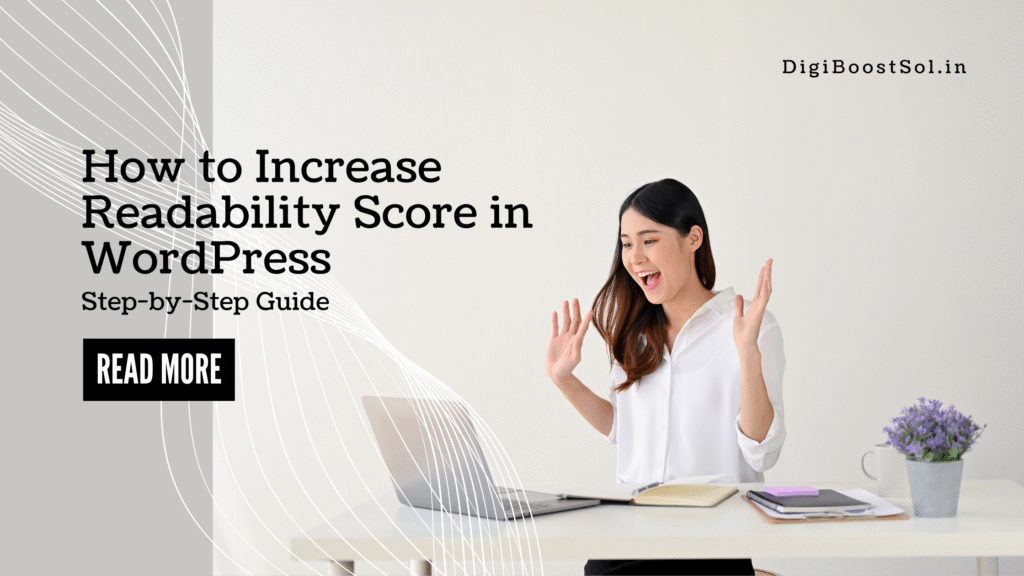How to Increase Readability Score in WordPress – Step-by-Step Guide
If you want your WordPress blog to rank higher on Google and keep your visitors engaged, one of the most overlooked factors is readability. A high readability score ensures that your content is easy to understand, enjoyable to read, and optimized for all types of readers, including search engines! In this blog post, we’ll guide you through increasing the readability score in WordPress, step by step, using best practices and tools such as Yoast SEO or Rank Math.

✅ What is Readability Score?
A readability score measures how easy it is for someone to read and understand your content. Tools like Yoast use the Flesch Reading Ease Score, where:
- 60-70 is considered good
- Higher scores = easier to read
🔍 Why Readability Matters
- Better User Experience: Visitors stay longer and read more.
- Improved SEO: Google prefers content that’s easy to read and understand.
- More Conversions: Readers are more likely to take action when they clearly understand your message.
🧩 Step-by-Step Guide to Improve Readability in WordPress
Step 1: Use Short Sentences
Long, complex sentences confuse readers and hurt your readability score.
✅ Tip: Keep your sentences under 20 words.
Example:
❌ “This plugin, which was developed by professionals with years of experience, helps you optimize your content for better SEO and readability scores.”
✅ “This plugin helps you improve SEO and readability. It was developed by experienced professionals.”
Step 2: Use Short Paragraphs
Avoid walls of text. A paragraph should ideally be 2–4 lines long.
✅ Why? It’s easier to read on mobile and desktop, especially for skimmers.
Step 3: Use Headings and Subheadings
Divide your content using H2, H3, and H4 tags to organize your content.
✅ Helps readers find what they’re looking for
✅ Google also uses headings to understand content structure
Step 4: Use Transition Words
Transition words guide readers from one point to another smoothly.
Examples: Firstly, Moreover, Therefore, For example, As a result
✅ Yoast SEO recommends using transition words in 30%+ + sentences
Example:
✅ Firstly, install the plugin. Then, activate it and configure the settings.”
Step 5: Use Active Voice
Content in the active voice is easier to read and more direct.
Example:
❌ Passive: “The content was written by the author.”
✅ Active: “The author wrote the content.”
Step 6: Avoid Difficult Words
Always choose simple, everyday words over complex ones.
❌ Utilize → ✅ Use
❌ Commence → ✅ Start
❌ Approximately → ✅ About
✅ Use tools like Grammarly or the Hemingway App to find difficult words
Step 7: Add Lists and Bullet Points
Bullet points or numbered lists make your content more scannable and engaging.
Example:
Here are some benefits of readable content:
- Better SEO rankings
- Higher engagement
- More social shares
- Lower bounce rate
Step 8: Use Images and White Space
- Add relevant images or infographics
- Leave white space around your text
- Improves focus and makes content feel light
Step 9: Use Readability Plugins
If you’re using WordPress, there are plugins designed to help improve readability.
🔧 Popular Plugins:
- Yoast SEO – Highlights readability issues like long sentences, passive voice, etc.
- Rank Math – Also offers readability suggestions within its SEO analysis
- Hemingway Editor – Not a plugin, but a great online tool for readability check
Step 10: Preview and Test Your Content
Before publishing:
- Use Preview mode in WordPress
- Check formatting on both desktop and mobile
- Read your content out loud to spot awkward sentences
📊 Bonus: Understanding Flesch Reading Ease Score
Here’s how the Flesch score is calculated (used by Yoast):
- 90–100: Very easy (5th-grade level)
- 60–70: Easy to read (8th–9th-grade level) – Ideal for blogs
- 30–50: Difficult (college level)
- 0–30: Very difficult
✅ Aim for 60–70 for the best readability balance
🧠 Final Thoughts
Improving your readability score doesn’t mean dumbing down your content. It means making your writing clear, structured, and enjoyable — both for readers and search engines.
So next time you publish a blog post in WordPress, follow this checklist:
- Keep it simple
- Use short sentences and paragraphs
- Add headings, lists, and transition words
- Use tools like Yoast or Hemingway
- Always put the reader first
📌 Have any questions about readability or SEO? Drop them in the comments below!


